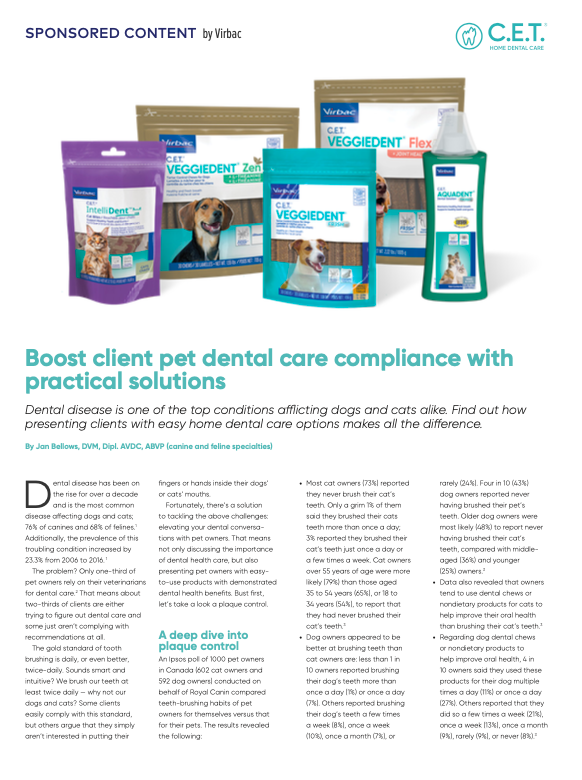
- dvm360 August 2021
- Volume 52
Boost client pet dental care compliance with practical solutions
Dental disease is one of the top conditions afflicting dogs and cats alike. Find out how presenting clients with easy home dental care options makes all the difference. (Sponsored by Virbac)
Dental disease has been on the rise for over a decade and is the most common disease affecting dogs and cats; 76% of canines and 68% of felines.1 Additionally, the prevalence of this troubling condition increased by 23.3% from 2006 to 2016.1
The problem? Only one-third of pet owners rely on their veterinarians for dental care.2 That means about two-thirds of clients are either trying to figure out dental care and some just aren’t complying with recommendations at all.
The gold standard of tooth brushing is daily, or even better, twice-daily. Sounds smart and intuitive? We brush our teeth at least twice daily — why not our dogs and cats? Some clients easily comply with this standard, but others argue that they simply aren’t interested in putting their fingers or hands inside their dogs’ or cats’ mouths.
Fortunately, there’s a solution to tackling the above challenges: elevating your dental conversations with pet owners. That means not only discussing the importance of dental health care but also presenting pet owners with easy-to-use products with demonstrated dental health benefits. Bust first, let’s take a look a plaque control.
A deep dive into plaque control
An Ipsos poll of 1000 pet owners in Canada (602 cat owners and 592 dog owners) conducted on behalf of Royal Canin compared teeth-brushing habits of pet owners for themselves versus that for their pets. The results revealed the following:
- Most cat owners (73%) reported they never brush their cat’s teeth. Only a grim 1% of them said they brushed their cats' teeth more than once a day; 3% reported they brushed their cat’s teeth just once a day or a few times a week. Cat owners over 55 years of age were more likely (79%) than those aged 35 to 54 years (65%), or 18 to 34 years (54%), to report that they had never brushed their cat’s teeth.3
- Dog owners appeared to be better at brushing teeth than cat owners are: less than 1 in 10 owners reported brushing their dog’s teeth more than once a day (1%) or once a day (7%). Others reported brushing their dog’s teeth a few times a week (8%), once a week (10%), once a month (7%), or rarely (24%). Four in 10 (43%) dog owners reported never having brushed their pet’s teeth. Older dog owners were most likely (48%) to report never having brushed their cat’s teeth, compared with middle-aged (36%) and younger (25%) owners.3
- Data also revealed that owners tend to use dental chews or nondietary products for cats to help improve their oral health than brushing their cat’s teeth.3
- Regarding dog dental chews or nondietary products to help improve oral health, 4 in 10 owners said they used these products for their dog multiple times a day (11%) or once a day (27%). Others reported that they did so a few times a week (21%), once a week (13%), once a month (9%), rarely (9%), or never (8%).3
Overall, the habits of owners related to brushing their pet’s teeth did not align with their attitudes toward pet oral health. For example, 76% agreed (27% strongly/49% somewhat) that they should brush their pet’s teeth to keep them healthy, while just 25% disagreed (5% strongly/20% somewhat). Additionally, dog owners (83%) were more likely than cat owners (72%) to believe they should brush their pet’s teeth.3
Why easy-to-use products can improve owner compliance
When discussing the significance of dental care with clients, it’s crucial that you emphasize the need for regular professional cleaning and consistent daily dental maintenance at home between visits. Additionally, present pet owners with practical home dental care options.
Virbac C.E.T brand products are customizable, easy to use, and trusted by veterinarians. C.E.T’s FR3SH family of products target oral causes of bad breath and aid in digestion and include dental chews, water additives, specialized toothbrushes, flavored toothpaste, and more.
CET’s multifunctional chews include the following:
- C.E.T VEGGIDENT FRESH: Canine tartar controls chews for digestive health.
- C.E.T VEGGIDENT Flex: Canine tartar controls chews for joint health.
- C.E.T VEGGIDENT Zen: Tartar controls chews to promote canine mental well-being.
- CET HEXtra and CET Enzymatic: Premium oral hygiene chews for dogs. The unique abrasive cleaning action helps to clean mouths and freshen breath.
- CE.T. IntelliDent Cat Bites: Clean teeth, freshen breath, and support healthy gums.
Administering one C.E.T. chew a day is one of the easiest ways to reduce plaque and tartar. With C.E.T. AQUADENT FR3SH, a dental solution used with water, you can offer pet owners another practical way to fight bad breath in their dogs and cats.
The takeaway
Changing the paradigm of pet dental disease is a team effort. In addition
to emphasizing the need for annual professional oral hygiene visits for dental scaling, polishing, full-mouth intraoral radiographs, we must reinforce good dental health at home. That’s why presenting clients with simple, viable solutions is so crucial.
To learn more about Virbac C.E.T brand products, visit
Articles in this issue
about 4 years ago
Case report: canine spinal cord nephroblastomaover 4 years ago
Extraocular myositis in a young pit bullover 4 years ago
Minimalist design, maximum effectover 4 years ago
IVSA and Vetstream announce a collaborative partnershipover 4 years ago
Pet Releaf debuts professional product line with SentesaNewsletter
From exam room tips to practice management insights, get trusted veterinary news delivered straight to your inbox—subscribe to dvm360.







